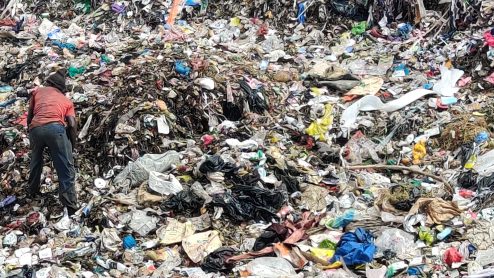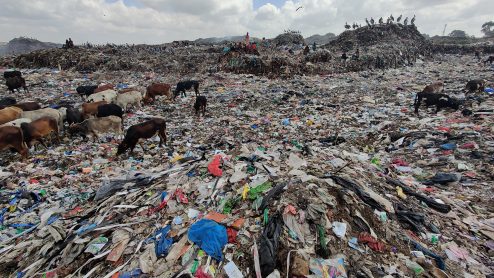I'd like to make a
The growing plastic plague
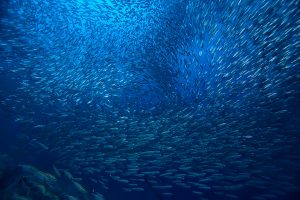
It’s been estimated that 9.2 billion tonnes of plastic were produced between 1950 and 2017, and that around seven billion tonnes of this is now waste, dumped in landfills or accumulating on land or in the sea.
Plastic pollutes every corner of our planet. Plastic microfibres have been discovered in a glacier at the heart of the Himalayas. A single-use plastic bag has been found at the bottom of the Mariana Trench, seven miles beneath the surface of the Pacific Ocean. This year, for the first time, scientists detected microplastics in human blood.
Did you know?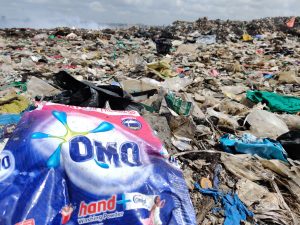
- The USA produces the most plastic pollution per person of any country in the world. The UK comes second.
- On average, each UK household throws away 66 pieces of plastic packaging a week. That’s 3,432 pieces a year.
- Only 12% of this plastic is likely to be recycled in the UK, while 17% is shipped overseas.
Source: The Big Plastic Count
The truth behind our trash
Where does all this plastic waste go? The unpalatable truth is that high-income countries that consume the most plastic, like the UK, European countries, Japan and the USA, don’t have enough capacity to recycle it all properly.
Instead, they pay to export their plastic waste to poorer countries, where companies take the money but often don’t have the right infrastructure to deal with the waste properly. These exports are overwhelming the plastic waste management systems of countries such as Malaysia, Vietnam and Turkey.
The illegal waste trade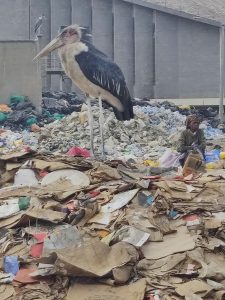
An illegal trade in plastic waste is also flourishing in these places, masterminded by criminal groups.
You may have seen news reports of UK plastic waste being exported to Turkey, then illegally dumped and burned. This is not a one-off.
The UK government has promised to consider a ban on plastic waste exports to certain countries, but the proposals have been repeatedly delayed.
We are reaching out to policy makers and companies to argue that the UK should ban plastic waste exports completely. High-income countries have a responsibility to deal with their own waste.
A global plastics treaty
EIA has been at the forefront of the campaign to secure an ambitious, legally binding global agreement on plastics for several years.

Earlier this year, EIA played a crucial role at a meeting of the United Nations Environment Assembly (UNEA), the world’s principal decision-making body on the environment.
We shared our expertise in plastic pollution and campaigned for a treaty which would include plastics at every stage of their lifecycle, from the creation of virgin (new) plastic to what to do with plastic waste.
An end to plastic pollution?
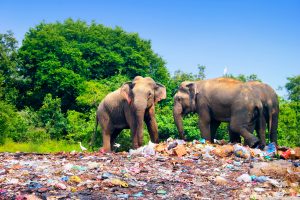
In a historic moment, the assembly agreed that the treaty would go ahead. Governments and decision makers from around the world now have until the end of 2024 to agree the final terms of a legally binding treaty on plastics.
EIA has coordinated a "Scientists' Declaration", backed by 183 scientists and 37 research institutions, which makes a strong case for a robust global treaty.
Above all, we’re calling for the treaty to dramatically reduce the amount of new plastic that can be produced. If we’re ever going to tackle the terrible scourge of plastic pollution, we need companies to stop making so much plastic in the first place.
With your help, we can keep going until we get a deal that delivers for the planet.
Please donate today to fight plastic pollution
We have already successfully achieved a landmark agreement that represents a huge step towards ending plastic pollution. Please donate today to help us:
- Keep campaigning for the best possible global plastics treaty during the next stage of negotiations.
- Take on the shocking problem of the plastic waste trade and illegal exports.
- Engage with retailers and farmers over the use of ‘agri-plastics’.
- Tackle other serious threats to our ocean, wildlife and the natural world.
99% of plastics come from fossil fuels. Please donate today to help us end plastic pollution, fight to protect the climate and save endangered wildlife.


